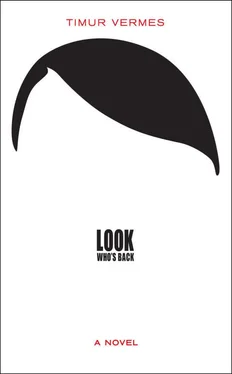“You do know that’s not his daughter, don’t you?” the cleavage said when this Lothar had left.
“I assumed as much,” I said. “Of course it couldn’t be his biological daughter; racially it just doesn’t work. I assumed he’d adopted the girl. I’ve always been a strong advocate of adoption; much better than having such a poor young thing grow up in an orphanage…”
The cleavage rolled her eyes.
“Can’t you say anything normal at all?” she sighed. “I need to go to the little girls’ room! Don’t run away! You might be awful, but at least you’re not boring.”
I took a sip of water. I was still wondering what to make of the evening when I was aware of a commotion behind me, a lady enveloped by a throng of journalists. The lady appeared to be one of the principal attractions of the event, as she was pursued by photographers and television cameras almost without pause. She had a southern complexion, which made her dirndl look particularly odd, and the arrangement of her décolleté was grotesque. This notwithstanding, if her overall appearance could be described as respectable in a vulgar sort of way, such an impression was shattered the moment she opened her mouth. She spoke at a pitch higher than that of any mechanical saw I ever heard. But the photographers and reporters were indifferent to the noise. She was just about to squeak into a camera when a photographer caught sight of me in the background and steered her to my table for a picture of the two of us. The lady appeared unenthusiastic.
I know that look. Behind the eyes laughing superficially, I could detect a merciless machine calculating whether or not this photograph would prove advantageous to her. What helped me to see through her expression was that I was making the same calculation myself, albeit much more rapidly and, moreover, producing an answer in the negative. Her hesitation told me that she, on the other hand, seemed not to have arrived at a conclusion. For her the consequences were uncertain and hence a risk, which she would rather have evaded with a witticism. By now, however, one of the photographers had surged forward and tossed into the fray the slogan “Beauty and the Beast”, from which moment the baying pack of press hounds was no longer stoppable. So the exotic reckoning machine took the bull by the horns and rushed towards me shrieking with laughter.
This type of woman is not a new phenomenon; she existed seventy years ago too, although she was not then as prominent. Her craving for recognition knows no bounds and her self-esteem is low. She endeavours to assuage this by trying to conceal each one of her supposed deficiencies. For unfathomable reasons this type of woman considers only one method to be suitable: turning everything into ridicule. She is the most dangerous type of woman a politician can meet.
“Wow, it’s you!” she whinnied, trying to throw herself at me. “How fab! Can I call you Adi?”
“You may call me Herr Hitler,” I told her soberly.
That is sometimes all it takes to put people off. She was undeterred, however. Sitting on my lap, she said, “Cool, Herr Hitler! So what are the two of us going to do for those cheeky old photographers? Eh? Hmm?”
In such a situation one has nothing to gain and everything to lose. Ninety-nine out of a hundred men would have lost their nerve at this point and beaten a retreat on the pretext of “readjusting the front line” or “redeploying units”. I had seen it often enough in the Russian winter of 1941, which at minus 30, even minus 50 degrees descended so suddenly on my troops. There was no lack of people who said, “Retreat, retreat!” I alone held my nerve and said, “On no account, not one metre back-wards! Any man who yields will be shot.” Napoleon failed, but I held the front, and in the spring we harried those bandy-legged Siberian bloodhounds like hares, over the Don, to Rostov, to Stalingrad and so on — I don’t wish to go into unnecessary detail now.
At any rate, there was no question of a retreat back then, nor now in this unpleasant beer tent. The situation is never hopeless if one possesses a fanatical will to victory. One only need think of the miracle which blessed the House of Brandenburg in 1762. Tsarina Elisabeth dies, her son, Peter, concludes peace, and Frederick the Great is saved. Had Frederick surrendered beforehand, there would have been no miracle, no Kingdom of Prussia, nothing at all, just a dead Tsarina. Many people say one cannot count on miracles. I say one can. One need only wait for them to appear. Until that time one must hold one’s position. For an hour, a year, a decade.
“You know, madam,” I said, winning myself some time, “I’m so pleased to be back here again, in beautiful Munich, the capital city of my movement — did you know that?”
“No, how interesting,” she squeaked cluelessly, and ran her fingers through my hair. For bints like this it is the simplest matter in the world to belittle a figure of authority by upsetting his appearance. If Providence had a miracle up her sleeve, then now was the time to unveil it.
All of a sudden one of the photographers thrust a fat, black pen under my nose.
“Why don’t you sign the dirndl?”
“The dirndl?”
“Of course!”
“Yeah! Fab idea!” This comment was fired from one his colleagues.
The basest human instincts are the most reliable of allies, especially if one lacks any others. The wench had not the slightest interest in having her dress signed. The photographers were most insistent, however; they must have scented a variation on the usual lewd cleavage photo. And she could offer only limited resistance to their entreaties. He who lives by the sword, dies by the sword, even if the sword is no more than a camera. In any event I spied an opportunity to stall the enemy, maybe even bring up some reinforcements.
“May I, madam?”
“But only on the material,” she squealed hesitantly. “And don’t make it too big.”
“Of course,” I said, and got down to business. Every second of time I won here counted double, so I augmented my signature with a few embellishments. I felt quite foolish, and after a while had to stop; I was beginning to resemble one of those little girls doodling in her friendship book.
“Finished,” I said regretfully.
One of the photographers said “Flipping heck!” The woman followed his gaze.
I watched with surprise as her horrified eyes widened to the size of saucers.
“Do excuse me, I know it’s a bit messy in the folds. That wouldn’t have happened, of course, with a normal drawing block. Did you know I used to be a painter once…?”
“Are you off you head?” she screeched, leaping off my lap. I could scarcely believe it. The Oktoberfest miracle.
“I’m sorry, madam?” I said. “I’m not sure I quite understand you.”
“I can’t go wandering around the Oktoberfest with a swastika on my chest!”
“But of course you can,” I reassured her. “This isn’t 1924, you know. This country may not have a sensible government, but the parliamentary windbags absolutely swear by freedom of expression, and…”
She was no longer listening; instead she was rubbing so furiously around her décolleté that it almost looked indecent. And even if I could not fully grasp her despair, the situation seemed to have been saved. She was the one who ended up not looking so good in the photographs. And in fact the television reports were even better; she could be seen springing up, her face hideously contorted and issuing a volley of insults. Most of the reports concluded with her driving off a few minutes later in a taxicab, looking livid and firing off the most astonishing expletives.
When all is said and done I would have preferred a more dignified appearance. But given the circumstances the outcome was more than respectable. At any rate I considered my own losses to have been lower than those of the enemy. The Volk always loves the watchful victor, he who knows how to defend himself, he who wastes no more effort on such a person than he would on a fly.
Читать дальше












